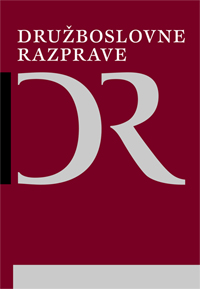Erozija hipertekstovne etike med avtorji spletnih mest
Erosion of Hypertext Ethics Among Authors of Web Sites
Author(s): Gregor PetričSubject(s): Social Sciences
Published by: Slovensko sociološko društvo (in FDV)
Keywords: hypertext; World Wide Web; ethics of hypertext; authors of web sites; normative action; web survey; linear structural equation model
Summary/Abstract: The article builds on the presupposition that the idea of hypertext as a specific mode of information organization in a nonsequential, decentralized system of interconnected text pieces, on which the technology of the World Wide Web (WWW) was developed, implies noble social changes in terms of democratization, stimulation of cooperation, advancement of epistemological processes and effective rationalization of human knowledge. Assuming the positive social impacts of hypertext the relevant research problem to analyze is the possibility of the WWW to retain hypertextual nature. The article focuses on a special, and a very important factor in this context – authors of web sites. Properties of the WWW are directly dependent upon its building blocks, web sites, yet their content is determined solely by the authors, who are largely unconstrained in their actions. The WWW retains the ideas of hypertext only if authors conform to certain latent rules, which are defined in the framework of the so-called ethics of hypertext. A theoretical insight is offered into the mechanism of social construction of action, which complies with the rules of the ethics of hypertext. Following the methodological steps of conceptualization and operationalisation, an empirical evaluation of the problem is presented on a sample of Slovenian web site authors. The methodological framework offers a theoretical explanatory model of hypertextual action as an action that reflects the ethics of hypertext and includes the following concepts: hypertextuality of action, perception of the norm of hypertextual action, perception of expert legitimization, belief in positive impact of hypertext and anonymity of action. Indicators were developed upon definitions of concepts. Subsequently, data was collected in the period from April to June 2002, by means of a web survey. A complex procedure was used to recruit the respondents and approximately 1000 valid units, individual authors of web sites, were obtained for further analysis. LISREL program was used to assess and verify the explanatory model of hypertextual action, whereby a surprisingly adequate model fit could be achieved. Thus the mechanism of social construction of hypertextual action seems to be valid. Although the ethics of hypertext is only latently present, it obviously has a strong social basis, since individual authors relatively often act in accordance with it. It is true that individuals use their web sites to reach their own goals, but they simultaneously show some concern for retaining the hypertext in the WWW.
Journal: Družboslovne razprave
- Issue Year: 19/2003
- Issue No: 44
- Page Range: 119-142
- Page Count: 24
- Language: Slovenian

